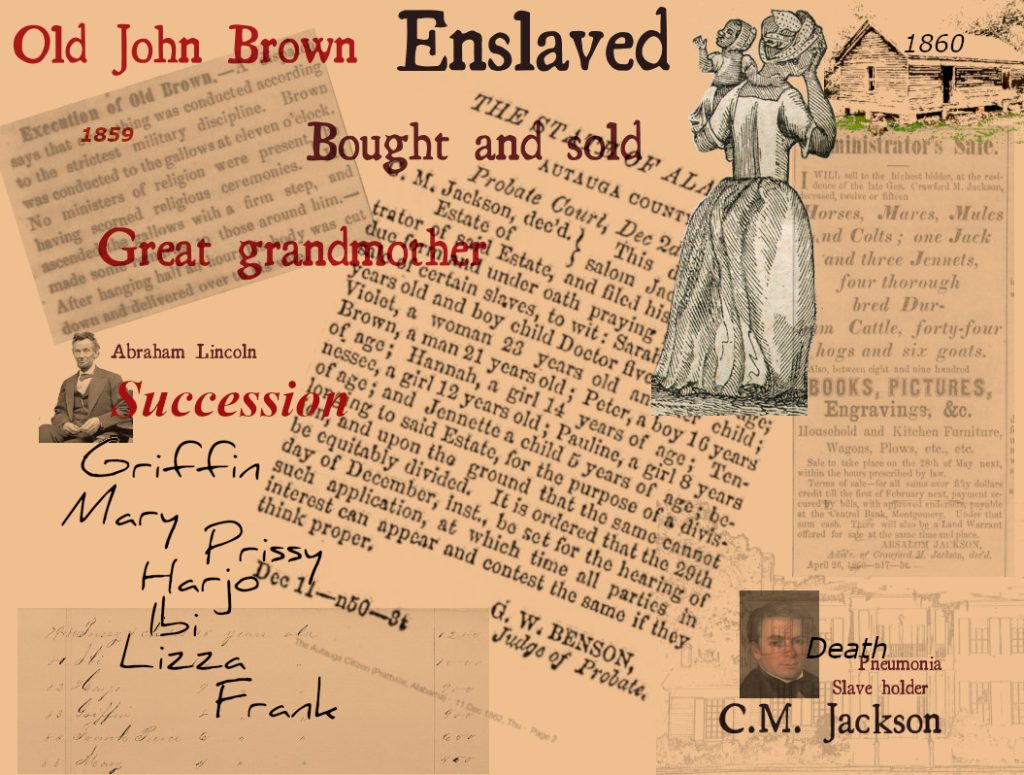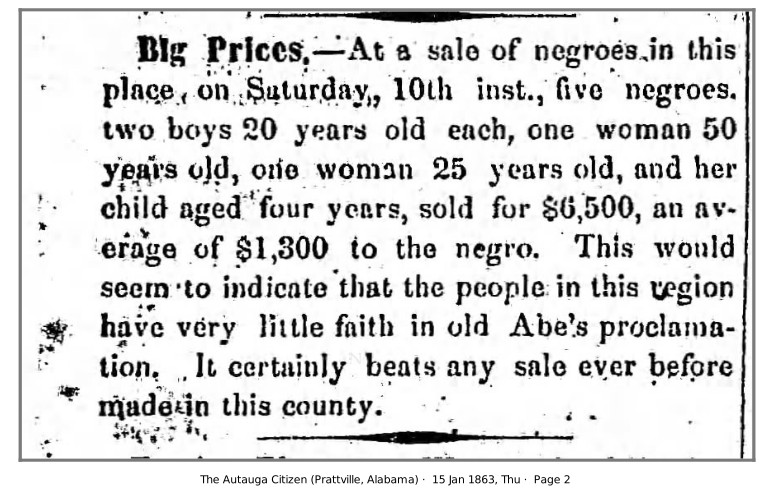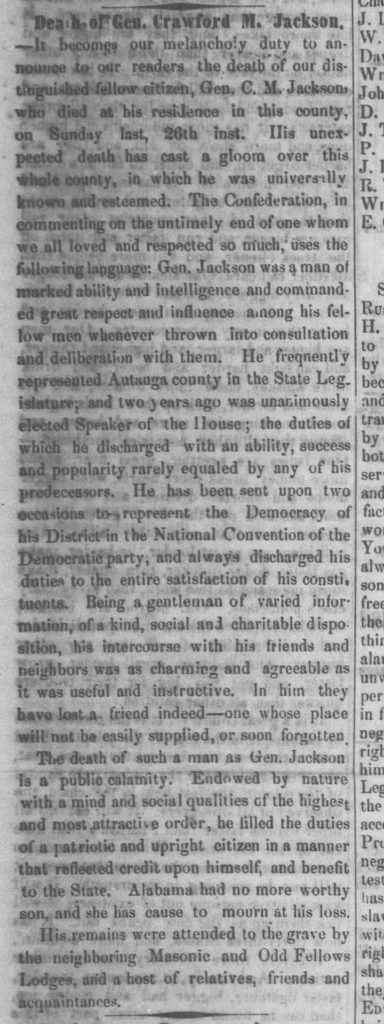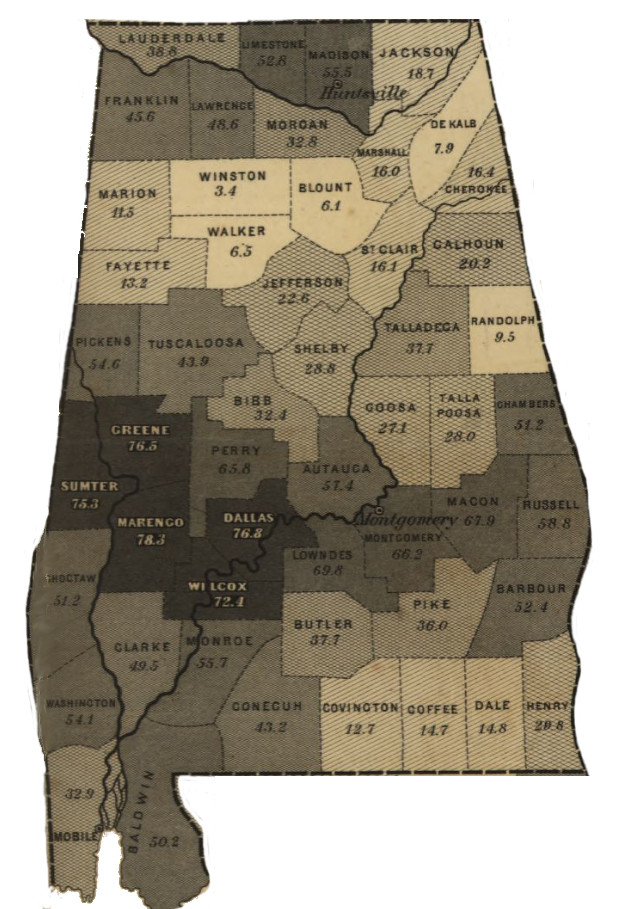
In November 1859 Crawford Motley Jackson, large slave holder, became ill. Bronchitis set in. On February 26, 1860, he died at age 43. He held 136 people in slavery.
Death of Gen. Crawford M. Jackson
It becomes our melancholy duty to announce to our readers the death of our distinguished fellow citizen, Gen. C. M. Jackson, who died at his residence in this county, on Sunday last, 26th inst. His unexpected death has cast a gloom over this whole county, in which he was universally known and esteemed. The Confederation, in commenting on the untimely end of one whom we all loved and respected so much, uses the following language: Gen. Jackson was a man of marked ability and intelligence and commanded great respect and influence among his fellow men whenever thrown into consultation and deliberation with them. He frequently represented Autauga county in the State Legislature; and two years ago was unanimously elected Speaker of the House; the duties of which he discharged with an ability, success and popularity rarely equaled by any of his predecessors. He has been sent upon two occasions to represent the Democracy of his District in the National Convention of the Democratic party, and always discharged his duties to the entire satisfaction of his constituents. Being a gentleman of varied information, of a kind, social and charitable disposition, his intercourse with his friend and neighbors was as charming and agreeable as it was useful and instructive. In him they have lost a friend indeed – one whose place will not be easily supplied, or soon forgotten.

The death of such a man as Gen. Jackson is a public calamity. Endowed by nature with a mind and social qualities of the highest and most attractive order, he filled the duties of a patriotic and upright citizen in a manner that reflected credit upon himself and benefit to the State. Alabama had no more worthy son, and she has cause to mourn at his loss.
His remains were attended to the grave by the neighboring Masonic and Odd Fellows Lodges, and a host of relatives, friends and acquaintances.
The Autauga Citizen Prattville, Alabama · Thursday, March 01, 1860
Crawford Motley Jackson belonged to one of the largest slave holding families in Autauga County. He owned 136 people when he died in 1860. His brother-in-law, Lunceford Long held 161 people in slavery. Jackson’s older brother, Absalom enslaved 61 people.
My 2X great grandmother, Prissy and her six children were among those enslaved on General Crawford Motley Jackson’s plantation. Using DNA evidence, at least some of her children were fathered by Crawford.
During the next several years, the estate was probated. Because he left no wife nor white children, his brother, and various nephews and nieces were his heirs. Several of them died during the process and the enslaved would have to be shuffled around to those still living, or sold off. The probate record is quite large and includes several lists of those enslaved among the mules, farm implements and household items.
Families were kept together until children reached the age of about 12 – 15, at which time they were often placed in a different household than the rest of their family.
According to U.S. Census data, the 1860 Autauga County population included 7,105 whites, 14 “free colored” and 9,607 slaves. 57.6% of the population was enslaved.
On November 8, 1860, Abraham Lincoln was elected 16th president of the United States. The Slave holding South was enraged at the possibility of losing their enslaved workforce. Succession soon followed. On January 1, 1863, Lincoln issued the Emancipation Proclamation. As you can see below, no one was freed by it.

“Big Prices, – At a sale of negroes (sic) in this place on Saturday, 10th inst., five negroes, two boys 20 years old each, one woman 50 years old, one woman 25 years old, and her child aged four years, sold for $6,500, an average of $1,300 to the negro (sic). This would seem to indicate that the people in this region have very little faith in old Abe’s proclamation. It certainly beats any sale ever before made in this county.”Big Prices, – At a sale of negroes (sic) in this place on Saturday, 10th inst., five negroes, two boys 20 years old each, one woman 50 years old, one woman 25 years old, and her child aged four years, sold for $6,500, an average of $1,300 to the negro (sic). This would seem to indicate that the people in this region have very little faith in old Abe’s proclamation. It certainly beats any sale ever before made in this county.”
The Autauga Citizen (Prattville, Alabama) 15 January 1863


Every time I read a slave schedule from the south before the war…I feel the same heaviness in my heart. Tears come to my eyes considering how families were divided and sold apart. That the love between these human beings was never part of the issue, just making money by the owners, the dealers, the horribly privileged white society that existed for so long in the southern states. My families benefited by the labor of slaves. My grandfather told me they were treated well. He hadn’t really been there. He was born in 1877. But he knew when I asked about our southern ancestors, that there was the underlying guilt which I took upon myself for many years. I’m so sorry to read more about your ancestors being sold after they were legally freed.
The Emancipation Proclamation only was the law in the Union states. That last article wasn’t about my relatives though. Those were some other poor enslaved people.
In my opinion, one of the most hurtful things to see in the will or probate record of the slave owner is the gifting of the unborn child/children of the enslaved. Before the child is conceived the parents have no right to make decisions concerning their own child. What a peculiar institution named chattel slavery.
And we’re their increase! The plan was for us and our children, grandchildren and on down to be enslaved.
I felt my anger rising as I read C.M Jackson’s obituary. I doubt he was “universally esteemed” by the majority of the Autauga population, although his death certainly created a “public calamity” among your ancestors and others whom he enslaved because their families were subsequently separated. Your blog post eloquently supports the need for reparations. Thank you for posting.
All of the slave holders obituaries that I have found are similarly positive. Makes sense because these were the pillars of their slave holding communities.